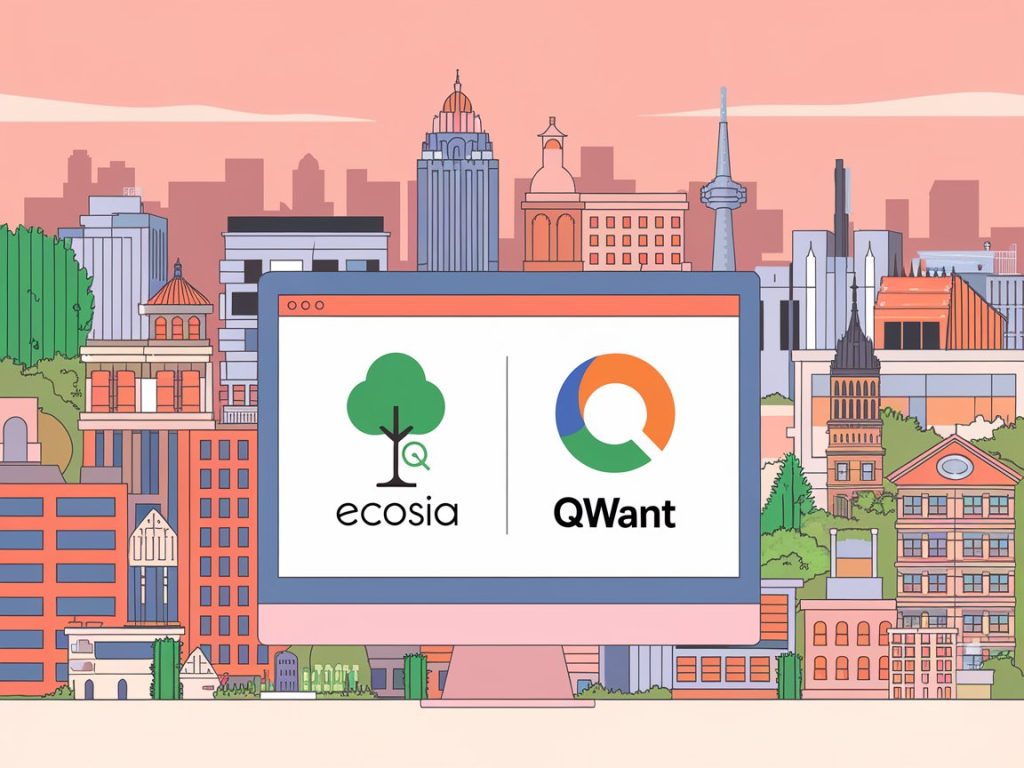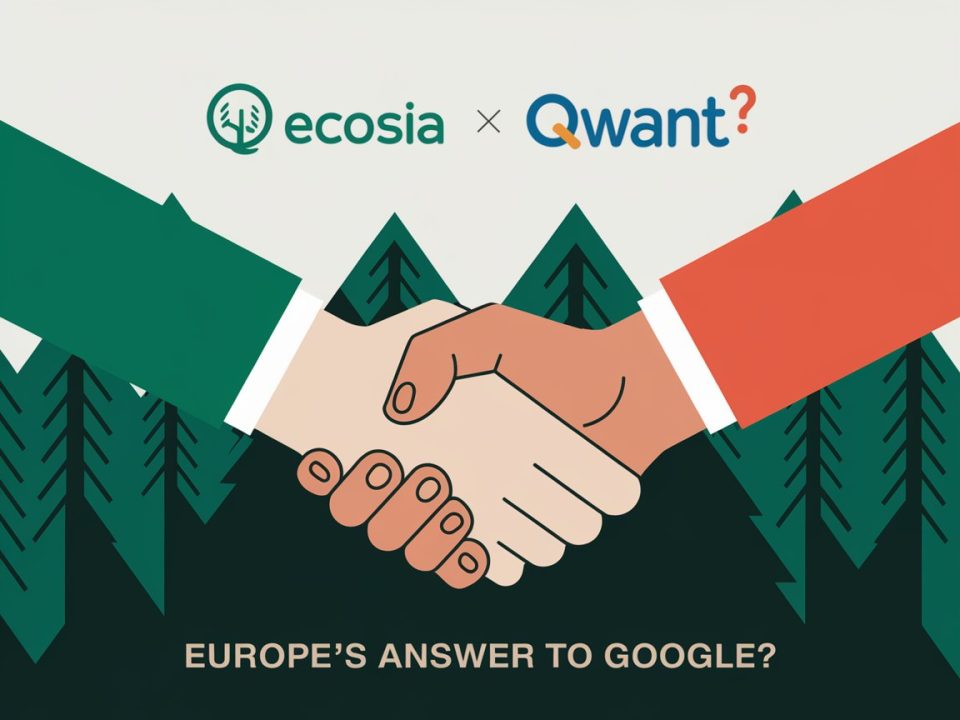In a world where Google and Bing dominate search, two European search engines, Ecosia and Qwant, are setting out to create an independent, eco-friendly, and privacy-centered search index. This initiative, called the European Search Perspective (EUSP), hopes to shift the balance by building a platform tailored for Europeans and aligned with sustainable goals. With their combined strengths—Ecosia’s commitment to environmental causes and Qwant’s dedication to privacy—this new project could reshape how we search. But will EUSP truly be Europe’s answer to Google? Let’s dive into what this collaboration entails, its goals, and what it could mean for European digital autonomy.
Why Ecosia and Qwant Are Building a European Search Index?

Ecosia and Qwant are gaining attention for their unique approach to search engines.
- Ecosia: Focuses on planting trees with its profits, contributing to global reforestation with every search.
- Qwant: Prioritizes user privacy, offering a search engine with no tracking or ad targeting.
Together, they aim to create a search experience that reflects European values and challenges current norms.
Background of Ecosia and Qwant
- Ecosia: Driven by environmental responsibility, Ecosia turns searches into positive environmental impact.
- Qwant: Offers a privacy-focused search experience, with no tracking, competing with major players like Google.
Challenges with Current Search Engines
- Both Ecosia and Qwant license data from Google and Bing, limiting their ability to customize results.
- They face challenges in offering more relevant or eco-friendly options.
- Existing search results are global and not always tailored to European preferences.
Drive for European Digital Sovereignty
- Ecosia and Qwant’s collaboration seeks to give Europe more control over its digital landscape.
- By creating the European Search Perspective (EUSP), they aim to develop search technology that aligns with European values and privacy standards.
- This initiative, based in Paris, hopes to empower Europe with its own digital sovereignty, a shift away from reliance on non-European platforms.
Check the: Human Factor: The Primary Risk in Cybersecurity for Industries
What is the European Search Perspective (EUSP)?
The European Search Perspective (EUSP) is a collaboration between Ecosia and Qwant to create a search engine that reflects European values, such as privacy and sustainability.
- It aims to break free from US-based search monopolies like Google and Bing.
- EUSP focuses on providing a privacy-first, eco-conscious alternative tailored to European users.
- The project hopes to build a search index designed specifically for European languages, cultures, and needs.
Overview of EUSP
- EUSP is a new search engine, built from the ground up in Europe, prioritizing privacy and local relevance.
- Its long-term goal is to give Europe more control over digital infrastructure, supporting advancements in AI and tech.
Ownership Structure
- EUSP is a 50/50 partnership between Ecosia and Qwant, each contributing expertise in sustainability and privacy.
- OVHcloud, a European cloud provider, supports the infrastructure, ensuring data security within Europe.
- The ownership model focuses on values rather than profit, differing from traditional tech ventures.
Environmental and Privacy Priorities
- Ecosia ensures sustainability is central to the project, focusing on energy reduction and tree planting.
- Qwant guarantees privacy, ensuring user data isn’t sold or misused.
- EUSP is designed to offer a search experience that respects both users and the environment, distinguishing it from major search engines.
Technology and Infrastructure of EUSP
Building the European Search Perspective (EUSP) requires advanced technology and strong partnerships, with OVHcloud playing a central role in ensuring the search engine’s independence and security.
Technical Details
- OVHcloud provides the scalable, secure cloud infrastructure needed to support EUSP.
- Based in Europe, OVHcloud ensures data stays within European borders, meeting local privacy regulations.
- This European focus aligns with EUSP’s commitment to data sovereignty and privacy protection.
Indexing Capabilities
- EUSP aims to build its own web index, challenging the dominance of search giants like Google.
- The search engine will be efficient, comprehensive, and designed to support multiple languages.
- Unlike Google, EUSP can prioritize eco-friendly results, reflecting its values.
Role of Artificial Intelligence
- AI is crucial for improving search relevance and user experience, adapting results based on real-time data.
- AI helps EUSP align searches with environmental goals, such as promoting train travel over flights.
- AI also supports a sustainable, energy-efficient infrastructure, reducing the environmental impact of indexing.
The Role of EU Regulations and the Digital Markets Act (DMA)
Europe’s Digital Markets Act (DMA) is reshaping the tech landscape by promoting fair competition and giving smaller players like Ecosia and Qwant a chance to compete with larger companies such as Google and Microsoft.
How DMA Supports New Players?
- The DMA requires tech giants to share exclusive datasets, including search, location, and usage data.
- This access allows Ecosia and Qwant to build a stronger, more competitive search platform without starting from scratch.
Impact on Data Access and Integration
- The DMA grants access to local business data previously controlled by Google, such as store hours and updates.
- Ecosia and Qwant can now integrate this data into EUSP, improving the search experience with up-to-date local information.
Encouraging a Diverse Ecosystem
- The DMA encourages a more diverse tech ecosystem in Europe by reducing the dominance of major players.
- It helps smaller companies, like Ecosia and Qwant, provide search alternatives aligned with European values, fostering innovation, cultural sovereignty, and data privacy.
EUSP’s Vision for an Eco-Friendly and Privacy-First Search Engine
Ecosia and Qwant aim to create a search platform that prioritizes both environmental sustainability and user privacy—values often overlooked by major search engines. Their goal is to build a search engine that aligns with European values, offering a more ethical alternative in an era of growing concerns about tech’s environmental and privacy impact.
Sustainability Goals
- Ecosia’s green mission drives EUSP’s focus on minimizing environmental impact.
- Energy-efficient practices will be implemented in data center operations and algorithms to limit energy use.
- EUSP aims to set a new standard for eco-friendly search engines.
Privacy-Focused Model
- Qwant’s privacy-first approach ensures user data is not tracked or sold.
- EUSP will comply with Europe’s strict data protection laws, providing a safe and private search experience.
Prioritizing Ethical Businesses
- EUSP could prioritize ethical businesses by giving higher visibility to eco-friendly companies.
- This approach encourages businesses to adopt sustainable and ethical practices, making search results a tool for positive change.
Comparison with Global Search Competitors
EUSP enters a competitive search landscape dominated by global giants like Google. However, there’s a growing demand for a search engine that caters to specific user needs and values, particularly in Europe. Let’s explore how EUSP compares to major competitors and the unique advantages it offers.
Google’s Dominance and Limitations
- Market Share: Google dominates the global search market, holding 90-95% of the share outside China.
- Strengths: Google’s algorithms deliver fast, relevant results from its vast database.
- Challenges:
- Privacy Concerns: Google’s data-driven model often compromises user privacy.
- Global Focus: Google’s approach lacks adaptation to regional values and needs, including privacy standards and cultural preferences.
Learning from Alternatives like Naver in South Korea
- Naver’s Success: Naver, South Korea’s dominant search engine, has thrived by catering to local language, culture, and preferences.
- Lesson for EUSP: By focusing on European languages, values, and privacy, EUSP can cultivate regional loyalty, similar to Naver’s success in South Korea.
EUSP’s Unique Appeal to European Users
- Privacy and Sustainability: EUSP’s commitment to user data protection and eco-friendly practices sets it apart from Google.
- Ethical Search: EUSP could prioritize eco-friendly and ethical businesses in search results, appealing to users who value sustainability and ethical consumption.
- Cultural Relevance: By aligning with European values, EUSP offers a localized search experience that global competitors can’t match, making it a potential preferred choice for European users seeking privacy, sustainability, and regional relevance.
Future of Search in Europe: EUSP’s Plans and Potential
EUSP’s introduction into the search engine space represents a transformative step toward reshaping how Europe engages with digital services. Ecosia and Qwant envision a model that embraces European values, prioritizing privacy and autonomy while offering an alternative to global tech giants. As EUSP progresses, it aims to establish a uniquely European approach to technology, grounded in digital sovereignty.
Timeline for Launch and Testing
- Phased Rollout: EUSP is set to begin testing in France as early as next year, with plans to expand into Germany by the end of 2025.
- User-Centered Approach: This phased launch allows for real-time feedback from users in France and Germany, enabling EUSP to fine-tune its search capabilities based on regional preferences.
- Continued Expansion: Once France and Germany are fully integrated, EUSP plans to expand across Europe, offering a search engine tailored to local needs and preferences.
Funding and Scalability
- Seeking Investment: To scale, EUSP is actively pursuing investment opportunities to expand its reach beyond French and German markets.
- Data-Driven Partnerships: EUSP aims to make its search index available to companies, particularly those looking to train AI with ethically sourced, European data.
- Scalable Infrastructure: EUSP’s partnership with OVHcloud provides the technical foundation necessary for scalability, allowing the platform to operate independently of U.S.-based tech giants.
A New Model for European Technology
- Digital Sovereignty: EUSP’s focus on privacy, sustainability, and regional control sets it apart from global competitors. It is paving the way for a new model of European tech, where autonomy and ethical practices take precedence.
- Inspiring Future Projects: EUSP’s success could inspire other tech initiatives focused on local relevance and user-centric ethics, contributing to Europe’s broader movement toward digital independence.
- Shaping the Future: EUSP’s mission aligns with the growing demand for data privacy and sovereignty, positioning it to play a pivotal role in the future of search and technology across Europe.
Conclusion
Europe’s answer to Google may not be a direct competitor, but Ecosia and Qwant’s EUSP offers a compelling, user-centered alternative rooted in privacy and sustainability. By investing in regional search technology, they aim to shape the future of search in Europe. As they expand and refine EUSP, users can look forward to more personalized, ethically-oriented search options. Will this new venture redefine how Europeans search? The success of EUSP will ultimately rest on its ability to deliver a high-quality, responsible, and independent search experience.
Also know: The US to Allocate $38 Million to Ukraine to Strengthen Cybersecurity
Reference URLs:
https://www.cnbc.com/2024/11/12/ecosia-qwant-partner-on-search-engine-tech-to-counter-googles-power.html
https://www.euronews.com/next/2024/11/12/europes-answer-to-google-ecosia-and-qwant-partner-to-build-new-search-index
https://techcrunch.com/2024/11/11/ecosia-and-qwant-two-european-search-engines-join-forces-on-building-an-index-to-shrink-reliance-on-big-tech/


